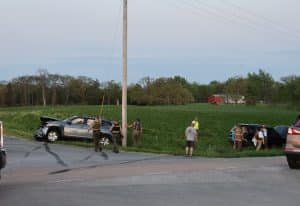Plenty of posturing, but still no state budget
The Illinois Legislature officially ended its session last Tuesday with no decisions made regarding a budget for the fiscal year beginning July 1.
While the Senate and House continue to work toward a viable spending plan for the next fiscal year, doing so will now require a three-fifths majority vote among legislators rather than a simple majority.
“It is tragic that Illinois is likely to enter its second consecutive year without a budget,” State Senate candidate Paul Schimpf (R-Waterloo) said. “Far too many Illinois families are struggling as a result of the continued budget impasse.
“Scores of providers around the 58th Senate District have awaited some resolution to the budget problem. This failure is unacceptable and Illinois will not survive with a continuation of the status-quo.”
State Senate candidate Sheila Simon (D-Carbondale) is running against Schimpf to represent the 58th District and agrees with his disappointment in the lack of a formal budget for the next fiscal year.
“I wouldn’t be surprised if we are feeling the same,” she said. “I think everyone is disappointed that there’s no budget yet. Stop gap (legislation) is not good enough. A budget is a plan, and people need to be able to plan for things. Legislators need to get to work.”
A stop gap is any temporary solution to a long-term problem. In other words, the problem would still need a long-term solution.
House Speaker Michael Madigan (D-Chicago) proposed a budget bill that passed through the Senate and House last Thursday. However, the Senate did not approve several amendments the House made to the bill, and therefore, legislators are back to the drawing board.
State Representative Jerry Costello II (D-Red Bud) voted to pass that budget because of the relief it would provide for public institutions reliant on state funding.
“The spending authority granted by Senate Bill 2048 … was a starting point to provide stability for those who rely on the state to meet our basic obligations,” he said. “Municipalities, small businesses and service providers for our most vulnerable citizens are on the verge of collapse as they wait on critical funding that they are owed by the state.”
House lawmakers will continue to meet every Wednesday in June beginning next week to negotiate a temporary spending plan. Legislators not taking part in these weekly discussions must return to Springfield upon the Speaker of the House or Senate President calling them back.
“We stand committed to remaining in session as long as it takes to fix this fiscal mess,” State Sen. David Luechtefeld (R-Okawville) said. “There are far too many critical situations which only get worse the longer the impasse remains in place.”
School funding uncertain
Uncertainty also continues on whether the state will disburse any sort of public school funding for the next fiscal year.
That period begins July 1, leaving lawmakers with less than a month to come up with a plan to save schools from closing for the fall.
Hours before the General Assembly’s adjournment, Democrats attempted to push a stand-alone school funding proposal, which was shot down in the House.
The stop-gap legislation looked to add almost a billion dollars to the education budget without a realistic way to fund those extra dollars.
“It is my hope that the education funding component can be settled sooner rather than later,” Luechtefeld said.
Waterloo, Columbia and Valmeyer schools will both open their doors in the fall regardless of state funding. Columbia School District Superintendent Gina Segobiano said the district is fortunate that only 20 percent of its funding comes from the state.
Waterloo school superintendent Brian Charron mentioned that local funding and reserves would get them through the beginning half of the school year. Valmeyer superintendent Eric Frankford said that under the worst circumstances, the school district’s working cash bond would be a saving grace.
As stressed in last week’s paper, each of the Monroe County schools would lose a chunk of funding under certain equity-based models. That is because these funding proposals create a system where areas with high poverty rates have a higher potential to receive more state funding.
Among these proposals, Senate Bill 231 shows losses into the millions for some districts, including Waterloo and Columbia. Introduction of the bill, then known as Senate Bill 1, brought about a wave of shock among Illinois school officials.
But before the proposal gained momentum through the Senate, Waterloo school superintendent Brian Charron marched up to the state capitol to demonstrate the negative impacts the bill would produce for his district.
Charron testified in Springfield before the House Education Task Force in March. Charron expressed his views of why Waterloo should not be made to suffer the fate of SB 1 at the time. Included in his reasoning, he said Waterloo schools require less in expenses per student while still giving a high quality education.
Waterloo spends $2,661 less per student for instructional expenses than the state average while students in the district scored in the top 1 percent in PARCC testing. Waterloo also employs teachers at an average salary of $15,416 less than the state average.
In the end, Charron spent a total of 45 minutes testifying. He said a majority of the task force showed him respect and asked a lot of questions, and he would return to testify in a similar situation if needed.
“It wasn’t pleasant, but someone has to speak up for districts that are being hurt by proposed funding formulas,” Charron said.
The House’s final action deadline for the bill is now June 30, the last day of the current fiscal year.






